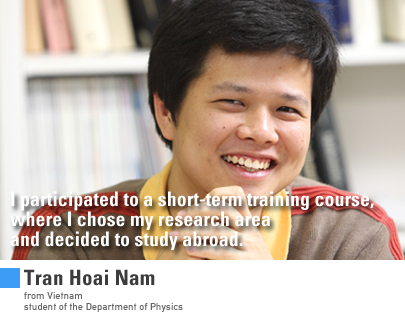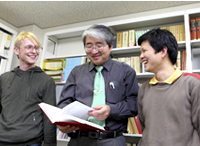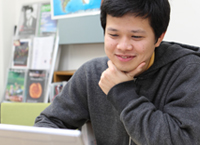
Encountering the frontiers of particle physics
In the summer of 2009 – the year before I started to study abroad, I participated in a one-month course held by the Department of Physics, Graduate School of Science, Osaka University, for students from Asian countries. In addition to being able to observe first-hand the world-leading advanced experiment facilities at Osaka University, this course allowed me to sit in on several physics lectures and experiments. I also visited the research laboratories which I was interested in and received detailed lectures about research areas from the professors. In that occasion I met Professor Kuno of the Experimental Particle Physics group and I decided that this was the laboratory I wanted to study in. However I was somewhat uncertain about the idea of studying in Japan. The IPC helped me resolve these concerns: when I heard that I could conduct research in English without taking any Japanese courses, I decided that I would study at Osaka University.


Constructing a system that will search for new physical phenomena
Now, about six months after I enrolled in the Doctorate course, I am a member of the MuSIC (Muon Science Innovative Channel) project. MuSIC is a facility to produce a highly intense muon beam and it is expected to provide one of the highest intensity muon beams in the world. The facility will be crucial in finding experimental evidence of charged lepton flavor violation (cFLV), which is forbidden in the current Standard Model of particle physics. Among the other muon beam facilities in the world, MuSIC has several special features: (a) high efficiency, thanks to a novel technology of the pion capture and muon transport systems; and (b) continuous beam time structure. In order to verify that the system is functioning as it was designed, we are conducting experiments at each stage of the construction process, and thanks to everyone in the laboratory this work has been proceeding smoothly. I am very fortunate and excited to have the opportunity to participate in the construction phase of a system that we will be able to present proudly to the world.
An enjoyable overseas study life centered on research activities
I am truly happy that I decided to study at the Osaka University IPC because I can take part in a global-scale research project under the instruction of a great professor. The members of the laboratory are friendly and we work well together as a team. Although they are all busy themselves, they also help me to conduct my own research. MuSIC involves a lot of international communication and through this research I am able to expand my network of contacts with physicists who are active in countries around the world. This network should be of great value to me in my life as a researcher in the future. Although I have experienced no real problems with my research and study, I am sometimes bewildered in my daily life because of differences in language and thinking. There is a teaching assistant in the laboratory who helps me in daily life and the IPC office staff are very helpful, for example by translating Japanese emails into English. There is also a community of Vietnamese overseas students at Osaka University, so we can talk together in our own language, exchange information, and chat with friends for a nice change of pace. I have also enjoyed visiting famous sightseeing areas such as Nara and Kyoto, and am very much enjoying my overseas life.
